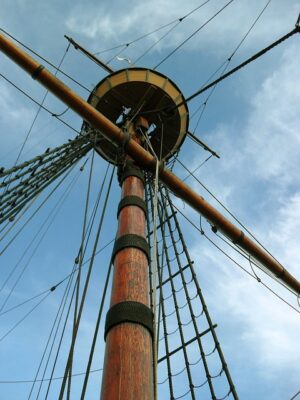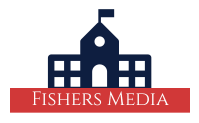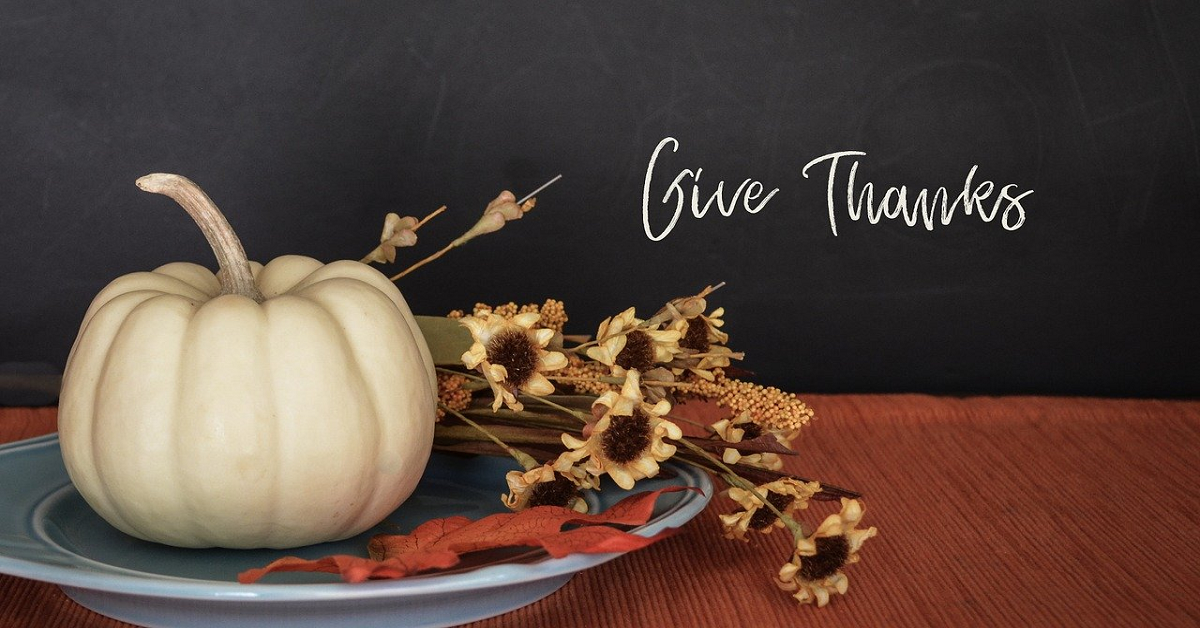What is Thanksgiving?
Thanksgiving is the day in November most of us in the United States think of a where we tear into our turkey and stuffing and then go into a tryptophan-induced couch-coma as the traditional Macy’s Thanksgiving Day Parade plays on our televisions. Some dread this day as the one time a year where they have to face their family members of an opposite political party and attempt to avoid sensitive subjects that could lead to arguments. But, sometimes it good to stop and remember why we have traditions and appreciate the abundance we enjoy in our country.
History of Thanksgiving
Our story of Thanksgiving actually begins in England around 1606 with the Puritans, a Christian group that separated from the Church of England. At that time England had established by law that everyone was required to belong to the Church of England. The Puritans believed the church should be separate from government control and under Christ’s Lordship only. This belief gave rise to the name: Separatists.
William Bradford, who was raised by relatives near Scrooby, a village in North Nottinghamshire, England, was drawn to a congregation of Puritan Separatists there, led by William Brewster and John Robinson. The Motto of the Scrooby congregation was “Reform ourselves without tarrying for any.” The Scrooby congregation just wanted to live in peace, obeying the teachings of the Scriptures. However, the newly crowned King James I, would not tolerate religious liberty. Some Separatists were maimed or burned at the stake and in 1607 the men of the Scrooby Congregation were imprisoned for eight months. The “Pilgrims” as they had become known, fled England for Holland in 1608 to escape persecution. There they lived in relative peace for twelve years in the walled city of Leiden. As time progressed however, they found it difficult to find work and they felt their children were being corrupted by moral laxity in the Dutch culture. So John Robinson, the Pilgrims’ minister since the early years in Scrooby, and his congregation decided it was time to emigrate.
The True Meaning of The Easter Holiday
The Mayflower

The Scrooby congregation spent three years in England negotiating to obtain permission to settle in the northern parts of the Colony of Virginia which extended north of the Hudson River at that time. They also negotiated with a group of financial backers in London known as the Merchant Adventurers. Robert Cushman and John Carver had made the final arrangements for the journey by July 1620. However, most of the congregation, including its leader pastor John Robinson were forced to stay behind as the King feared Robinson’s effect on distant America and would not permit him to go. The congregation sent thirty-eight of its most trusted leaders including William Brewster, William Bradford and John Carver to the New World. They departed Deftshaven on a ship they had chartered called the Speedwell. The Speedwell was supposed to meet up with the Mayflower off the coast of England, where both ships would depart for northern Virginia. However, the Speedwell proved to be too structurally unsound to make the voyage and the passengers transferred to the Mayflower where conditions were now very cramped.
Departing from Plymouth, England in August 1620, they endured a treacherous sixty-six-day journey across the Atlantic and landed in what is now known as Plymouth, Massachusetts, far north of their intended charter. Since they were out of the territory of the king’s charter, they feared mutiny. So the men of the Mayflower gathered in the captain’s cabin on November 11, 1620 to sign a covenant with each other to form a new government. This document, now called the Mayflower Compact, is America’s first great constitutional document.
The Origins of Veterans Day
The Mayflower Compact
IN THE NAME OF GOD, AMEN. We, whose names are underwritten, the Loyal Subjects of our dread Sovereign Lord King James, by the Grace of God, of Great Britain, France, and Ireland, King, Defender of the Faith, &c. Having undertaken for the Glory of God, and Advancement of the Christian Faith, and the Honour of our King and Country, a Voyage to plant the first Colony in the northern Parts of Virginia; Do by these Presents, solemnly and mutually, in the Presence of God and one another, covenant and combine ourselves together into a civil Body Politick, for our better Ordering and Preservation, and Furtherance of the Ends aforesaid: And by Virtue hereof do enact, constitute, and frame, such just and equal Laws, Ordinances, Acts, Constitutions, and Officers, from time to time, as shall be thought most meet and convenient for the general Good of the Colony; unto which we promise all due Submission and Obedience. IN WITNESS whereof we have hereunto subscribed our names at Cape-Cod the eleventh of November, in the Reign of our Sovereign Lord King James, of England, France, and Ireland, the eighteenth, and of Scotland the fifty-fourth, Anno Domini; 1620.
Mr. John Carver, Mr. William Bradford, Mr Edward Winslow,
Mr. William Brewster. Isaac Allerton, Myles Standish,
John Alden, John Turner, Francis Eaton,
James Chilton, John Craxton, John Billington,
Joses Fletcher, John Goodman, Mr. Samuel Fuller,
Mr. Christopher Martin, Mr. William Mullins, Mr. William White,
Mr. Richard Warren, John Howland, Mr. Steven Hopkins,
Digery Priest, Thomas Williams, Gilbert Winslow,
Edmund Margesson, Peter Brown, Richard Britteridge
George Soule, Edward Tilly, John Tilly,
Francis Cooke, Thomas Rogers, Thomas Tinker,
John Ridgdale Edward Fuller, Richard Clark,
Richard Gardiner, Mr. John Allerton, Thomas English,
Edward Doten, Edward Liester.
They Tried Socialism (Spoiler alert, it didn’t work back then either)
Within the first four months of arrival in the New World, the Pilgrims lost 47 of the 102 settlers due to cold and disease. Many of the women did not survive because they gave their coverings and food to their children. Under the rule of the merchant adventurers who funded their venture, they were mandated to communal farming and labor (socialism), which led to two years of near starvation. William Bradford, who had become governor by this time, was forced to cancel the contracts, and go to free enterprise allowing each family to farm their own land. Their productivity increased tremendously as a result.
In Bradford’s own words:
The failure of this experiment of communal service, which was tried for several years, and by good and honest men proves the emptiness of the theory of Plato and other ancients, applauded by some of latter times, – that taking away private property, and the possession of it in community, by a commonwealth, would make a state happy and flourishing; as if they were wiser than God. For in this instance, community of property (so far as it went) was found to breed much confusion and discontent, and retard much employment which would have been to the general benefit and comfort.
If you want to know why liberal college professors hate the story of Thanksgiving so much, this is the reason; because it proves socialism doesn’t work. It has little to do with their concern for the natives (Indians as they were called back then). In fact most of the early colonies were wiped out by native tribes, not the other way around. The Mayflower pilgrims were one of the few colonies that survived thanks to a Christian native named Squanto of the Pawtuxet tribe who spoke fluent English. He joined the colonists, taught them how to farm and helped them survive.
What is St. Patrick’s Day?
The First Thanksgiving
sign of rain to be seen: yet toward evening it began to overcast, and shortly after to rain with such sweet and gentle showers as gave them cause of rejoicing and blessing God. It came without either wind or thunder or any violence, and by degrees in that abundance as that the earth was thoroughly wet and soaked therewith. Which did so apparently revive and quicken the decayed corn and other fruits, as was wonderful to see, and made the Indians astonished to behold… For which mercy, in time convenient, they also set apart a day of thanksgiving.
This was the foundation for America’s Thanksgiving tradition which has survived to this day. William Bradford recorded that from that day, they never again experienced famine or drought.
Thanksgiving Becomes a Legal Holiday
President Abraham Lincoln declared Thanksgiving a national holiday on October 3, 1863 in gratitude for an important Union Army Victory at Gettysburg. He announced that the nation will celebrate an official Thanksgiving holiday on November 26, 1863. The speech he gave, which was written by Secretary of State William Seward, declared the fourth Thursday of every November thereafter would be considered and official U.S. holiday.

